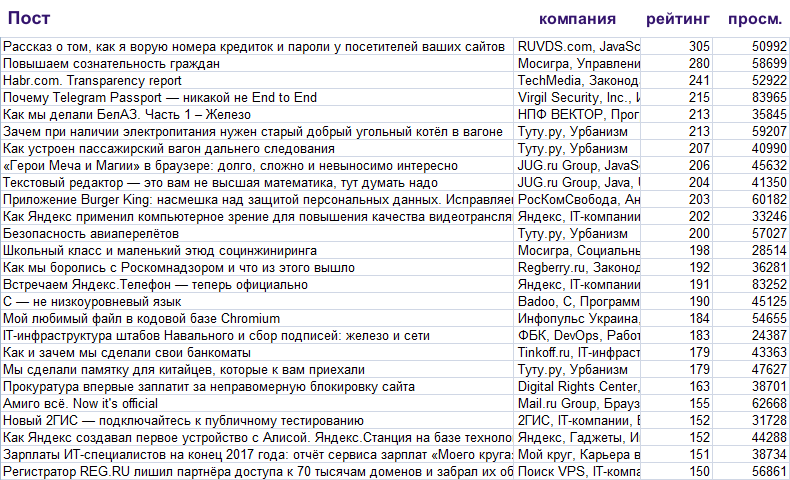Why corblogs sometimes turn sour: a few observations and tips
If a blog posts 1-2 articles a month with 1-2 thousand views and only a half-dozen pluses, it means that something is being done wrong. Moreover, practice shows that in most cases, blogs can be made both interesting and useful.

Perhaps now many opponents of corporate blogs will come running, and in some ways I agree with them. But let's first give a few positive examples.
You can start with Mosigra , Pochtoy.com useful people , My Circle salary ratings, Tutu.ru. Offhand, I can name a dozen more companies, where sometimes excellent posts slip through. In addition, there are many pros who write in corporate blogs and post transcripts of their hit reports there. By the way, rummaging through the statistics of 2018, I pulled out just such a sign of the post, which scored more than 150 pluses.

In general, everything can turn out well (while “young marketers” do not put their hands on them). And personally, I am sad to watch when the Habr is stuffed with mediocre content, which they then plus according to the order.
Knowing the whole kitchen from the inside, I’m not going to blame anyone and, moreover, point a finger. It so happens that it remains only to take a deep breath.
It was a disclaimer. The post itself is addressed to those who oversee company blogs, and who have the opportunity to change something.
When a journalist delves into the same topic for a couple of years that is not related to his personal vocation or is not part of his hobby, there will be burnout. No, the work can still be done, as it were, qualitatively, but already without a twinkle. Boring topics, laziness once again to pull the speaker and clarify details. Yes, and over time, oh, how it becomes blurry - it begins to seem that there is nothing interesting here, and they already wrote about everything.

In general, a reboot is needed. You can try experimenting with motivation by setting bonuses for achieving certain KPIs. However, this does not work in all cases, and it is better to start from another.
Marketing in the company tells the blog editor that it is necessary to make the next announcement of a mitap (or a new version of the product). And so that the blog does not turn into a bulletin board, posts are diluted with translations in one. In other words, the blog is used for a purely utilitarian purpose, without a soul. And this is the same situation when ... when and so everyone understands everything. Therefore, there will be no advice.
There are blogs on Habré where news articles or articles are published that find a certain response from the reader, but which have no relation to the company or its field of activity.
Why, why? This is probably how budgets are mastered by agencies that do not have close contact with their customers and work out the budget as they can.
However, there are examples when companies cleverly get out of this corkscrew by adding a small separate block from a couple of sentences to the end of the posts. There, they, as it were, between the others, report on their news or place promotional codes, linking them to the stories described in the article.
You can talk for a long time on the blog about the advantages of your product, low price and other “goodies”, but if you forget about the pain of your potential client and don’t offer him simple and clear solutions in the style of “how to do this and that” (on your elemental base), consider that you are shooting from a cannon at sparrows. Someone who is in the subject may hook.
Those working in the B2B direction often publish posts exclusively for the end user: all kinds of guides, FAQs, reviews, life hacks. Moreover, this audience, as a rule, is not a direct customer of these products. And they are bought at a level higher to solve any tactical or strategic moments in the company. And for these people, as a rule, there is not a word in blogs.
Ask yourself: can you read the headline and see what’s interesting in the article? Scrolling through the tape, the reader usually grabs the headlines and pictures. And if they do not give a clear idea of the content, most will pass by.

The same with indexing by search engines. Habr has a high weight among other sites, and articles from it are easily selected on the first page of the issue. But if the subject of the story is not indicated in the title, only a few will find this article.
By the way, this problem becomes no less noticeable in the Khabrovsky mailing list, where only the post headers get. And this, by the way, is a small pebble in the garden of Habr himself.
When people share deep expertise in any field - this is very good. First of all, for the image, and for the advanced reader, who, sometimes, has nowhere to get expert knowledge from.
But this “coin” has a downside. In ancient times, we joked that each formula in an article halves its readership. Now it has become even more relevant. And the point here is not only the ability to explain complex things in simple terms, but the fact that there are a dozen newcomers per one cool pro. Therefore, an article with the heading “where to start learning JS” will gather many times more grateful readers than a cool story about writing your own static typifier.
PS in a good way, here it’s worth adding about marketing, whose ears sometimes stick out so that they interfere with reading the text, but that's another story.

Perhaps now many opponents of corporate blogs will come running, and in some ways I agree with them. But let's first give a few positive examples.
You can start with Mosigra , Pochtoy.com useful people , My Circle salary ratings, Tutu.ru. Offhand, I can name a dozen more companies, where sometimes excellent posts slip through. In addition, there are many pros who write in corporate blogs and post transcripts of their hit reports there. By the way, rummaging through the statistics of 2018, I pulled out just such a sign of the post, which scored more than 150 pluses.

In general, everything can turn out well (while “young marketers” do not put their hands on them). And personally, I am sad to watch when the Habr is stuffed with mediocre content, which they then plus according to the order.
Knowing the whole kitchen from the inside, I’m not going to blame anyone and, moreover, point a finger. It so happens that it remains only to take a deep breath.
It was a disclaimer. The post itself is addressed to those who oversee company blogs, and who have the opportunity to change something.
The following is a selection of things that make blog articles poorly read, as well as observations on why some posts do not bring any benefit to the company.
The team or contractors ran out of steam
When a journalist delves into the same topic for a couple of years that is not related to his personal vocation or is not part of his hobby, there will be burnout. No, the work can still be done, as it were, qualitatively, but already without a twinkle. Boring topics, laziness once again to pull the speaker and clarify details. Yes, and over time, oh, how it becomes blurry - it begins to seem that there is nothing interesting here, and they already wrote about everything.

In general, a reboot is needed. You can try experimenting with motivation by setting bonuses for achieving certain KPIs. However, this does not work in all cases, and it is better to start from another.
Try connecting fresh heads to the development of the content plan. Brainstorm. After all, a cool idea for a post will light a spark not only in the soul of a tired journalist or expert.Although, the reasons may be in another. For example, banal overload. An artist is not a machine for printing masterpieces. He cannot give out hits only in strictly defined time and thematic frames.
Carpet bombing announcements and transfers
Marketing in the company tells the blog editor that it is necessary to make the next announcement of a mitap (or a new version of the product). And so that the blog does not turn into a bulletin board, posts are diluted with translations in one. In other words, the blog is used for a purely utilitarian purpose, without a soul. And this is the same situation when ... when and so everyone understands everything. Therefore, there will be no advice.
Content just entertains the public
There are blogs on Habré where news articles or articles are published that find a certain response from the reader, but which have no relation to the company or its field of activity.
Why, why? This is probably how budgets are mastered by agencies that do not have close contact with their customers and work out the budget as they can.
However, there are examples when companies cleverly get out of this corkscrew by adding a small separate block from a couple of sentences to the end of the posts. There, they, as it were, between the others, report on their news or place promotional codes, linking them to the stories described in the article.
The reader has his own pain
You can talk for a long time on the blog about the advantages of your product, low price and other “goodies”, but if you forget about the pain of your potential client and don’t offer him simple and clear solutions in the style of “how to do this and that” (on your elemental base), consider that you are shooting from a cannon at sparrows. Someone who is in the subject may hook.
Posts are not for those
Those working in the B2B direction often publish posts exclusively for the end user: all kinds of guides, FAQs, reviews, life hacks. Moreover, this audience, as a rule, is not a direct customer of these products. And they are bought at a level higher to solve any tactical or strategic moments in the company. And for these people, as a rule, there is not a word in blogs.
Art headlines
Ask yourself: can you read the headline and see what’s interesting in the article? Scrolling through the tape, the reader usually grabs the headlines and pictures. And if they do not give a clear idea of the content, most will pass by.

The same with indexing by search engines. Habr has a high weight among other sites, and articles from it are easily selected on the first page of the issue. But if the subject of the story is not indicated in the title, only a few will find this article.
By the way, this problem becomes no less noticeable in the Khabrovsky mailing list, where only the post headers get. And this, by the way, is a small pebble in the garden of Habr himself.
Hardcore Race
When people share deep expertise in any field - this is very good. First of all, for the image, and for the advanced reader, who, sometimes, has nowhere to get expert knowledge from.
But this “coin” has a downside. In ancient times, we joked that each formula in an article halves its readership. Now it has become even more relevant. And the point here is not only the ability to explain complex things in simple terms, but the fact that there are a dozen newcomers per one cool pro. Therefore, an article with the heading “where to start learning JS” will gather many times more grateful readers than a cool story about writing your own static typifier.
PS in a good way, here it’s worth adding about marketing, whose ears sometimes stick out so that they interfere with reading the text, but that's another story.
All Articles